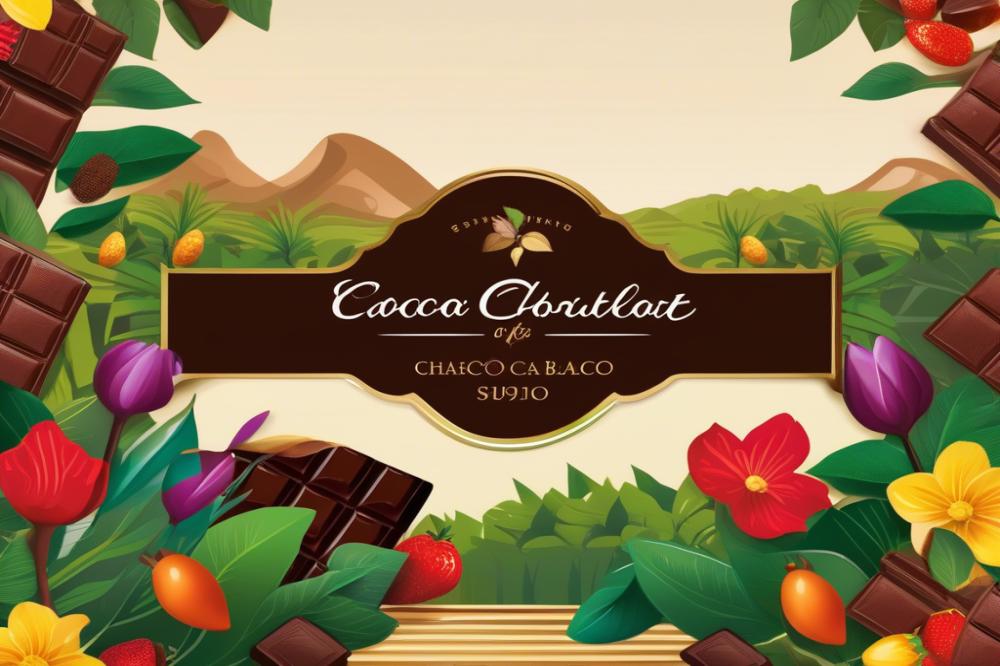Understanding ethical chocolate
Consumer interest in ethical chocolate is on the rise. This type of chocolate goes beyond delicious flavor; it embodies principles of fairness and sustainability. Shoppers increasingly seek products that reflect their values. This shift in behavior plays a significant role in promoting fair trade practices among producers. By choosing these options, consumers support better wages for cacao farmers and stronger communities.
Every purchase impacts the supply chain. People now demand transparency regarding where their food comes from. Ethical consumption also assures that the environment is considered. Many brands focus on organic chocolate, which benefits both the earth and the farmers. Cacao farmers experience substantial gains when they work under fair trade conditions. These practices can lead to community development and improved living standards.
Moreover, when companies prioritize environmental sustainability, they help protect our planet. Fair trade products often come with commitments to animal welfare too. The choices made by consumers can create a ripple effect that fosters social impact. Advocates argue that each bar of chocolate purchased can aid in building a better future. Embracing ethical chocolate is not just a personal choice; it’s a step towards a kinder world for everyone.
Understanding Ethical Chocolate

Have you ever heard of ethical chocolate? It’s not just a treat; it represents a way of supporting farmers and communities around the world. Chocolate can come from many sources, but some choices are better for society and the planet.
Fair trade plays a critical role in this discussion. When chocolate is fair trade certified, it means it meets certain standards designed to help farmers get paid fairly. This is significant because many cacao farmers live in poverty despite the high demand for chocolate. By buying fair trade products, consumers can contribute to a more equitable world.
Another important aspect is supply chain transparency. What does this mean? It refers to being open about where and how products are made. When companies disclose their sourcing methods, it allows consumers to make informed choices. Knowing the origin of cacao can encourage people to support brands that prioritize ethical practices.
The importance of supporting cacao farmers cannot be overstated. These individuals are the backbone of the chocolate industry. Unfortunately, many face challenges such as unfair wages and poor working conditions. By choosing ethically sourced chocolate, shoppers can help improve their livelihoods. This, in turn, fosters community development and enhances social impact.
Moreover, ethical consumption extends beyond just the farmers. It often involves environmental sustainability too. Organic chocolate, for instance, is made without harmful pesticides, benefiting both the planet and our health. This conscious choice supports methods that protect the environment, which is vital in today’s world.
Lastly, we should also consider animal welfare when discussing this topic. Sustainable cocoa production often involves ethical farming practices that respect all living beings. As consumers, our choices can influence the nature of farming practices globally, making a difference for both people and animals.
Benefits to Cacao Farmers

Ethical chocolate positively impacts cacao farmers by providing them with fair wages. Many small-scale farmers live in poverty. Fair trade practices offer better income and help to uplift these communities. Better pay leads to improved living conditions, which is crucial for families.
Working conditions also see significant improvements. Farmers often labor in harsh environments, but ethical brands focus on safety. They promote better farming practices that protect both humans and the environment. This commitment to environmental sustainability helps protect our planet for future generations.
Community development initiatives funded by ethical brands create lasting change. These programs might build schools or offer healthcare to rural areas. Access to education is vital for young children, giving them opportunities to break the cycle of poverty. Health initiatives help families stay well, increasing productivity and happiness.
Many personal stories illustrate the benefits of ethical practices. Take the story of Maria, a cacao farmer in Ecuador. With support from an ethical brand, she started a co-op with her neighbors. This group secured fair trade certification, significantly boosting their income. Now, Maria can afford to send her children to school and provide better nutrition.
Another example is Antonio, who works on a farm that transitioned to organic chocolate production. The farm now focuses on more sustainable practices that protect local ecosystems. Thanks to the support from ethical consumers, Antonio’s community has seen investments in healthcare and infrastructure. This has led to cleaner water and improved living conditions for everyone.
Consumer choices have a big impact on these farmers’ lives. When people choose ethically sourced products, they support better practices. This encourages more farmers to adopt sustainable methods. Additionally, supply chain transparency gives consumers insight into where their chocolate comes from, promoting ethical consumption.
Animal welfare is also a concern that resonates with many consumers. Ethical brands often address the treatment of animals in their supply chains. By ensuring humane treatment for any animals involved in farming, these companies show that social impact is important. This approach reflects a commitment to ethics on multiple levels.
Overall, the benefits to cacao farmers from ethical chocolate practices are significant. Fair trade increases income, while community initiatives enhance quality of life. The positive stories of individuals like Maria and Antonio underscore the real-life changes being made. Supporting these practices means making a difference in the world.
Social Impact of Ethical Chocolate

Purchasing ethical chocolate carries a significant social impact. It can foster social equity by supporting fair trade practices. When consumers buy these products, they directly contribute to better wages for cacao farmers. Those farmers often live in marginalized communities that have faced economic challenges for generations. Empowering them improves their quality of life and helps lift entire communities out of poverty.
Many consumers might not realize their choices can lead to meaningful change. Ethical consumption often promotes supply chain transparency. This means buyers can trace where their chocolate comes from and how farmers are treated. Such knowledge builds trust between consumers and producers, creating a more equitable market. Every bar of organic chocolate purchased sends a message about valuing ethical practices.
The importance of community development cannot be overstated. With fair prices, farmers can invest in their communities. This leads to better schools, healthcare, and infrastructure. Moreover, improved incomes can help farmers sustain their lands and practice environmental sustainability. A thriving local economy allows communities to reduce their reliance on harmful practices and deforestation.
Animal welfare also plays a critical role in ethical choices. Many brands that focus on social responsibility will not only treat their workers fairly but also ensure that their production processes are kind to animals. This holistic approach to ethical consumption is essential. When consumers support ethical brands, they encourage the industry to adopt better practices.
Overall, consumer choices in the chocolate market can create ripples in the global economy. It’s not just about enjoying a sweet treat; it is about making thoughtful decisions. People hold the power to support initiatives that uplift others. Each purchase contributes to a larger movement towards equity and sustainability. If everyone made mindful choices, the collective impact could transform lives.
Environmental Sustainability in Ethical Chocolate
Choosing chocolate with a conscience can greatly benefit our planet. The cultivation of cacao often leads to significant environmental challenges. Ethical chocolate supports methods that promote biodiversity and protect natural habitats. Farmers who grow cacao sustainably work in harmony with the ecosystem instead of against it.
Organic chocolate is a prime example of this commitment. Without the use of harmful pesticides and chemicals, organic practices nurture the soil and the surrounding environment. Healthy soil leads to better quality cacao, which benefits both farmers and consumers. This choice not only enhances flavor but also encourages a clean supply chain transparent for everyone involved.
Sustainable cacao farming methods help prevent deforestation. Clear-cutting forests for cacao plantations reduces vital wildlife habitats. By opting for fair trade products, consumers can support farmers who prioritize responsible land use. These initiatives encourage community development and protect the Earth’s resources for future generations.
In addition to promoting biodiversity, ethical practices contribute to animal welfare. Wildlife thrives when farmers maintain a balance in their land use. Making informed consumer choices helps to send a message about the importance of environmental responsibility. Every purchase can reflect a commitment to sustainability.
Ultimately, purchasing ethical chocolate fosters a positive social impact. It supports cacao farmers who strive to protect their environment. Fair trade certifications often imply a dedication to sustainable practices. This not only helps to preserve nature but also improves farmers’ livelihoods and communities.
Animal Welfare in Ethical Chocolate Production
Animal welfare plays a significant role in the production of ethical chocolate. Many companies today recognize the importance of treating animals humanely within their supply chains. A growing number of chocolate brands are committed to ensuring that the animals are cared for responsibly. This commitment often reflects a broader mission of social impact and community development.
Fair trade practices often extend beyond human workers to animal treatment. Brands that embrace these practices often advocate for farms that follow high ethical standards. They work to create a system where both the people and animals involved in the cacao farming process benefit. For example, some farms implement guidelines to protect local wildlife, creating a balanced environment.
Consumers are becoming increasingly aware of animal welfare issues. Awareness leads to informed consumer choices. When shoppers choose organic chocolate or brands that prioritize animal care, they support a healthier ecosystem. This choice doesn’t just promote ethical consumption; it ensures a compassionate approach to products we love.
Transparency in the supply chain is essential here. Responsible brands provide information about their practices and the origins of their ingredients. This transparency helps build trust with consumers, making them more likely to support ethical chocolate. Shoppers can feel good knowing their purchases contribute to a better world for animals.
Environmental sustainability also ties into these welfare efforts. Many ethical brands understand that animal welfare is linked to the health of the planet. By supporting sustainable farming methods, they protect habitats for animals while promoting the well-being of the surrounding communities. In this way, the treatment of animals goes hand in hand with community development.
Furthermore, ethical companies often collaborate with cacao farmers. These relationships benefit both producers and the animals in their care. Improvements in farming methods can enhance both productivity and animal welfare. This dual advantage leads to a more responsible and compassionate industry.
Making Informed Consumer Choices
Choosing chocolate can go beyond just satisfaction. It’s an opportunity to align purchases with personal values. That means making informed consumer choices is crucial. Many brands now promote transparency in their operations. These companies view their commitments as a positive social impact.
Understanding how chocolate is made is essential. Look for labels that mention fair trade practices. This certification guarantees that cacao farmers receive a fair price for their labor. Trustworthy brands will often highlight their supply chain transparency. When companies are transparent, it helps consumers know where their money is going.
Organic chocolate is another option many are exploring. By choosing organic, you support farming methods that are better for the environment. These practices help protect wildlife and promote environmental sustainability. Moreover, this choice often benefits community development as it encourages local farming.
Animal welfare is another aspect to consider. Certain brands go the extra mile to ensure their practices do not harm animals. Researching how brands treat animals can guide your choices. It’s vital to support businesses that prioritize the wellbeing of all creatures involved in production.
As consumers, we hold power. Every time you reach for a chocolate bar, ask yourself who made it. By purchasing from ethical brands, you contribute to improving the lives of farmers. Recognize that your choices can make a tangible difference.
Make a Difference with Every Bite
Supporting ethical chocolate is more than just enjoying a sweet treat; it represents a choice that can drive significant social impact. When consumers opt for chocolates that are produced responsibly, they contribute to better labor conditions, fair wages, and sustainable farming practices. Farmers in developing countries face many challenges, and choosing fair trade products helps uplift their communities.
Each purchase sends a message. Shoppers express their values by selecting brands that prioritize ethical practices. Over time, these consumer choices have the power to transform industries. As awareness grows, companies are pressured to adopt better methods. This cycle creates a ripple effect, encouraging more businesses to align with ethical standards.
A commitment to purchasing chocolate that is produced ethically ultimately leads to a more equitable world. Together, consumers can promote fair trade, protecting not just the environment but also the people who cultivate the crops. Supporting these values strengthens communities and nurtures a healthier planet for future generations.
Indulging in chocolate should bring joy, but it can also foster change. By making better choices, readers can contribute to a brighter future. Let’s embrace this opportunity to build a better tomorrow, one delicious bite at a time.



